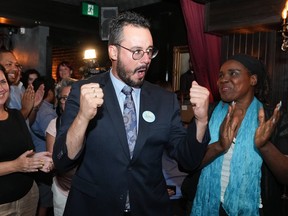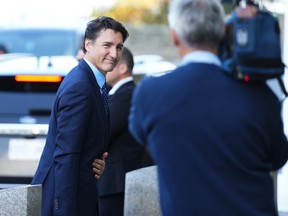Article content
Canada edged closer to an early election Monday night — two ridings closer. The Liberals showed once again that they can’t win an urban seat.
Under Prime Minister Justin Trudeau, this party is on the verge of electoral obliteration. The Liberals prove they can lose not just anywhere, but everywhere.
Impossible as this might seem for Canada’s so called national governing party, it can happen. Old parties do die.
Advertisement 2
Article content
The most vivid example is the great Progressive Conservative wipeout of 1993, when the party Brian Mulroney built dropped from a majority to two seats in Parliament.
That led to the end of the PCs as a party. Such a thing had seemed impossible. The same fate awaits the party Trudeau refuses to release from his bondage.
Worried Liberals now recall the 2011 election, when they won only 34 seats. No, it’s worse than that. The Liberals are about to become the woolly mammoths of politics; memorable, but extinct.
The NDP won Winnipeg’s Elmwood-Transcona riding in a squeaker with the surging Conservatives. The Liberals got a pathetic 4.8 per cent of the vote in that riding.
NDP Leader Jagmeet Singh comes out re-energized and looking strategically adept. It’s quite likely that New Democrat Leila Dance would have lost if Singh hadn’t ditched the toxic supply and confidence deal with the Liberals.
In the 1980 election the Liberals won only two western seats, both in Winnipeg. Ontario and Quebec still delivered them a majority.
It’s now possible they will win no seats from Manitoba through to British Columbia. And the old central Canadian bastions are dead to them.
Article content
Advertisement 3
Article content
Mondays real test was Montreal’s LaSalle-Emard-Verdun riding. The Bloc Quebecois won with 28 per cent of the vote. The Liberals got 27.2 per cent and the NDP 26.1 per cent.

Pierre Poilievre’s Conservatives were nowhere in that race, with 11.6 per cent, despite their commanding lead in national polls.
You’d think that with the leading party virtually absent, the Liberals could have pulled this one off. But the result showed that any combination of vote splits will defeat them.
This follows the Liberals’ shocking loss to the Conservatives three months ago in Toronto-St Paul’s, a riding right next door to Deputy Prime Minister Chrystia Freeland’s.
She was desperately flailing away on the eve of these byelections, promising 30-year mortgage amortization. This she hailed as a boon to first-time buyers, when it just means they’ll end up paying even more for a house.
Singh’s NDP and Yves-Francois Blanchet’s Bloc Quebecois now have even more leverage over Trudeau and his Liberal minority. The survival of the government from day-to-day is entirely up to them.
They must be sorely tempted to trigger an election. The Bloc could sweep Quebec and the NDP has every prospect of winning more seats than the Liberals.
Advertisement 4
Article content
But the colder calculation, once the thrill fades away, is that they’ll have no parliamentary leverage at all if the Conservatives win the expected majority.
Nonetheless, it’s hard to say what might happen in a Parliament as emotional and fractious as this one.
Singh might actually imagine he can replace the Liberals in government. Blanchet could like the idea of the Bloc becoming the official Opposition, as it was from 1993-97.
And what of Trudeau? His resistance to the obvious is almost pathological. He seems to think he can win again as the champion of the carbon tax, the only leader who cares about climate change.
Mulroney brought in the wildly unpopular GST in 1991. We know what happened to his party in 1993.
The trajectory of the carbon tax in public opinion is eerily similar. So is the course of Trudeau’s popularity.
Extinction awaits.
Don Braid’s column appears regularly in the Herald
X: @DonBraid
Article content






